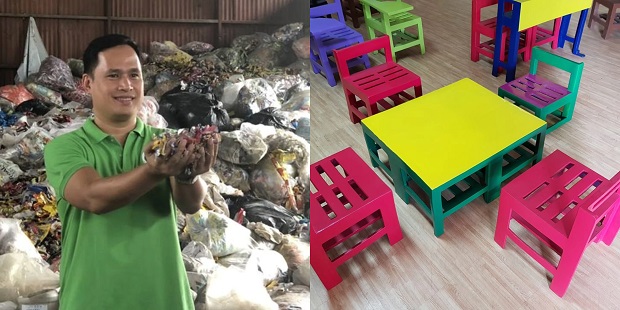The Incubation Network, in partnership with the Global Plastic Action Partnership, UpLink by the World Economic Forum, and the Alliance to End Plastic Waste, have recently launched the “Plastic Waste to Value Southeast Asia Challenge” to tackle plastic waste mismanagement in the region.

Established to accelerate innovative solutions that are focused on plastic recycling and upcycling in Indonesia, the Philippines, Thailand, and Vietnam, the competition has named five innovators that will be participating in the tailored development program over the course of five months.
The challenge received a total of 101 applications through the UpLink platform. Forty-eight shortlisted candidates were assessed by academic researchers, corporate sustainability practitioners, innovators, and climate & circular economy specialists.
The selected innovators will receive partnership building opportunities, mentorship, increased visibility, access to networks, and grants to scale their solutions.
“Working in partnership with the Global Plastic Action Partnership and the Alliance to End Plastic Waste, The Incubation Network is committed to support solutions that will enhance waste management ecosystems and accelerate the move towards a circular future for plastics,” said Simon Baldwin, global head of circularity at SecondMuse.
“We are very excited. The selected innovators have demonstrated a compelling opportunity for growth and economic and environmental impact.”
Urgent sustainable solutions are needed to combat the ever-growing global plastic waste pollution crisis. Between 2017-2019, an estimated 2 million tons of plastic waste leakage per year came from Indonesia, the Philippines, Thailand, and Vietnam. This accounts for 17% of annual global marine plastic waste leakage. Plastic waste that is not polluting waterways is either burnt or dumped — posing a significant threat to environmental and biodiversity health.
“Innovative solutions are critical to address plastic waste management in the region. We are thrilled to have worked closely with The Incubation Network and the Alliance to End Plastic Waste to identify an impressive cohort of Top Innovators with high-impact solutions that bring value to plastic waste. We look forward to providing the Innovators with greater visibility and impact in the region,” said Poonam Watine, knowledge specialist at Global Plastic Action Partnership.
Solutions have been assessed based on their contributions to at least one of the three focus areas:
- Increasing the amount of plastic waste managed, processed and/or recycled;
- Supporting the operational improvement of plastic waste management and recycling; and
- Improving working conditions of enterprises in plastic waste management and recycling.
The Plastic Waste to Value Southeast Asia Challenge cohort includes:
- Bank Sampah Bersinar (Indonesia) — Bank Sampah Bersinar is a social enterprise that provides community-based waste management solutions.
- Envirotech Waste Recycling Inc. (Philippines) — Envirotech collects Single-use plastic (SUPs) and turns them into useful products such as school chairs.
- Kibumi (Indonesia) — Kibumi is a disruptive startup company that strengthens the plastic recycling supply chain through digitalized and modernized waste collection points.
- Plastic People (Vietnam) — Plastic People transforms plastic waste into useful and upcycled products such as furniture or accessories.
- TerraCycle Global Foundation (Thailand) — TerraCycle Global Foundation provides simple, innovative, and high impact solutions to prevent, remove, and recycle waste from the environment.
“Ending plastic waste is a clear and urgent necessity recognizing both the environmental costs and economic losses when plastic waste is not recovered,” said Nicholas Kolesch, vice president for projects at the Alliance to End Plastic Waste.
“With growing demand for post-consumer plastic, the Plastic Waste to Value Southeast Asia Challenge will support ventures in the region to close this gap, getting plastics out of the environment and back into a circular economy.”
On-the-ground implementation will be supported by venture builder Impact Hub Manila. Icely Nicole Recato Dy, junior project manager at Impact Hub Manila, said: “We are always actively supporting changemakers wanting to create impact through lessening the plastic pollution in the Philippines. As the country is gearing towards lessening plastic consumption and promoting alternatives, we realize that there is still a long way to go. We continuously find ways to support entrepreneurs and changemakers that are working towards these goals.”
The Plastic Waste to Value Southeast Asia Challenge is led by The Incubation Network, the Global Plastic Action Partnership, UpLink by the World Economic Forum, and funded by the Alliance to End Plastic Waste, and supported by SecondMuse, The Circulate Initiative, Global Affairs Canada, and DEFRA.




